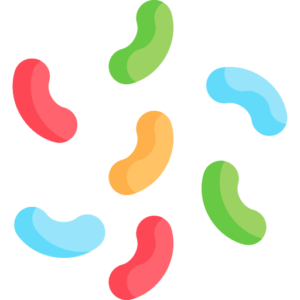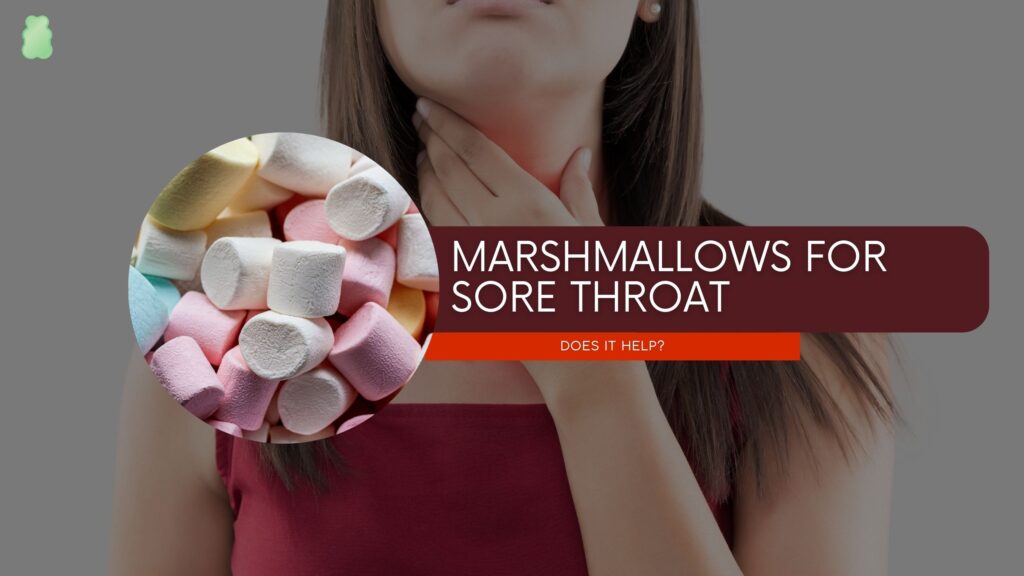Table of Contents
ToggleUnlike your dog, jelly beans are a delightful treat that is intended for people only. They are loaded with sugar, artificial flavors, and colorings, as well as potentially harmful substances such as xylitol or caffeine, to name a few. Some of these elements can be hazardous to our canine companions, and some can even be fatal to them.
Although you may not have intended to offer your dog jelly beans, it is possible to drop one on the floor and find it has been gobbled before you realize what has transpired. So, are they safe for dogs to eat? Is it safe to consume them, or are they harmful?
Even though your dog must not eat jelly beans, some kinds are safer than others for him to consume. Even if your pup appears to be in good health, consult your veterinarian if you are unsure about the type of food they have just taken
You Might Like: https://realgoodgummies.com/can-dogs-eat-candy-canes
What does Jelly Beans Contain?
Xylitol

If Fido consumes any sweet treats that contain this artificial sweetener, he could die as a result. It causes a rapid decline in blood sugar levels to dangerously low levels, referred to as “hypoglycemia.” Typically, this occurs within 30 minutes of consuming xylitol-containing food, although it might occur sooner or later depending on how rapidly the candy has been digested
Ingredients for jelly beans include sugar, tapioca or corn syrup, pectin or starch, and other additives. The emulsifying agent lecithin, anti-foaming agents, food-grade wax such as carnauba wax or beeswax, salt, and confectioner’s glaze are used in the recipe in relatively small quantities.
Effects of Different Ingredients in Jelly Beans if Consumed Wrongly
Caffeine ![]()
In comparison to humans, caffeine has a more severe effect on your dog than it does on humans. If even a modest amount of caffeine is eaten, it is possible to develop indicators of toxicity. Caffeine is absorbed in your dog’s gut within 45 minutes of consuming it, and symptoms are usually noticeable two hours after eating the caffeine. As a result, you must take your dog to the veterinarian as soon as possible.
Pectin
The starch in most jelly beans is responsible for their jelly-like consistency. A form of starch known as pectin can be found within certain types of confectionery. This ingredient can also be present in some veterinary products that are used to treat diarrhea. If your dog consumes significant amounts of pectin, it may experience digestive difficulties such as constipation.
Is Xylitol bad for dogs?
 Humans and dogs both have insulin released by their pancreas, which regulates blood sugar in both of their bodies. Xylitol has been shown in humans not to affect the release of insulin from the pancreas. When dogs eat xylitol, the xylitol is rapidly absorbed into the body, resulting in significant insulin production from the pancreas, which is beneficial to diabetic dogs.
Humans and dogs both have insulin released by their pancreas, which regulates blood sugar in both of their bodies. Xylitol has been shown in humans not to affect the release of insulin from the pancreas. When dogs eat xylitol, the xylitol is rapidly absorbed into the body, resulting in significant insulin production from the pancreas, which is beneficial to diabetic dogs.
This rapid release of insulin significantly reduces blood sugar (hypoglycemia), which can occur as quickly as 10-60 minutes after ingestion. Hypoglycemia, if left untreated, can be life-threatening.
Can dogs eat black licorice jelly beans?
Most likely not. Black licorice is perfumed with the extract of the liquorice plant, which is an old herbal treatment for upset stomachs and sore throats that can be found in many cultures. A modest amount may be helpful for your dog as well. Licorice root, on the other hand, has the potential to be hazardous when ingested in high quantities. This is due to the chemical glycyrrhizin, which, when consumed in large quantities, can produce elevated blood pressure.
Additionally, giving your dog sugar is not a brilliant idea because it increases the risk of teeth decay, obesity, and diabetes.
Can dogs eat Starburst jelly beans?

Even though Starburst jelly beans are sweetened with apple juice, they are also manufactured with artificial flavors and colors.
These jelly beans are incredibly harmful to your dog, and you should prevent them from eating them. If your dog consumes some, keep an eye out for signs of an allergic response and contact your veterinarian if you notice anything unusual about their behavior.
Can Dogs Eat Jelly Belly Jelly Beans?
No, intentionally feeding your dog jelly belly jelly beans is not a good idea. Even jelly beans containing xylitol or caffeine frequently have significant sugar and starch levels, which can induce stomach distress. They may gain weight and develop diabetes, heart problems, and dental disease if left untreated for an extended period.
Can dogs Eat Harry Potter jelly beans?
 No, dogs should never be allowed to consume harry potter jelly beans. They are stuffed with chemicals that are harmful to dogs’ health when finished. Sugar, xylitol, pectin, and caffeine are all hazardous to pets’ health and well-being.
No, dogs should never be allowed to consume harry potter jelly beans. They are stuffed with chemicals that are harmful to dogs’ health when finished. Sugar, xylitol, pectin, and caffeine are all hazardous to pets’ health and well-being.
You should exercise extreme caution when allowing your dog to consume sugar. While sugar is not instantly harmful, consuming an excessive amount of it in one’s diet can increase one’s chance of developing diabetes, obesity, and heart disease.
Can dogs Eat just born jelly beans?
The answer is a resounding no. And this is because just born jelly beans include a diverse range of substances that might be both unhealthy and poisonous to your canine companion.
Sugar, corn syrup, and starch are three of the most essential ingredients in this dessert. It also contains edible wax, anti-foaming ingredients, and confectioner’s glaze, among other things. Each candy is also flavored with a variety of artificial flavorings, which is a nice touch.
My dog ate three jelly beans! What should I do?
![]() Step 1: Collect any remaining jelly beans, as well as any packaging they may have accumulated. Check to see (if it’s possible) how many jelly beans your dog has consumed so far. In addition, check the bag to determine if your dog has gotten any of the packings into his mouth.
Step 1: Collect any remaining jelly beans, as well as any packaging they may have accumulated. Check to see (if it’s possible) how many jelly beans your dog has consumed so far. In addition, check the bag to determine if your dog has gotten any of the packings into his mouth.
![]() Step 2: Look over the jelly beans to see what they are made of. Investigate whether or not they included xylitol. If your dog has consumed a significant amount of xylitol-containing jelly beans, you should take him to the veterinarian right once. This may be a medical emergency.
Step 2: Look over the jelly beans to see what they are made of. Investigate whether or not they included xylitol. If your dog has consumed a significant amount of xylitol-containing jelly beans, you should take him to the veterinarian right once. This may be a medical emergency.
![]() Step 3: keep an eye out for any signs of illness or changes in behavior in your dog.
Step 3: keep an eye out for any signs of illness or changes in behavior in your dog.
Even if the jelly beans were created with sugar, you should still take your dog to the clinic since he could become very ill.

The type of treatment your dog receives will be determined by how many jelly beans they have consumed, whether or not the jelly beans contain xylitol, and whether or not your dog has consumed any of the packagings. The most important thing to remember in this situation is to seek the counsel of your veterinarian as soon as possible after your dog has consumed jelly beans. Following therapy, the majority of dogs should make a full recovery.
Conclusion
To summarise, it is always preferable to avoid giving your dog certain dog foods that are not recommended. Jelly beans, for example, are not advised for your pet due to the high concentration of artificial substances in their composition. It is undoubtedly enticing to give your dog these brightly colored treats, but think about all of the potential health dangers you are exposing your dog to before you do so!
I love reading and writing. A big-time foodie and a true gummy fanatic.
Dog mom with a goal to stay fit and healthy. Lately following the vegan lifestyle.
- September 30, 2023



![Vodka Gummy Bear Recipe [Tasty Fun party Snack] in 2023, DIY 17 Refrigerate the Gummy bears](https://realgoodgummies.com/wp-content/uploads/2023/05/Gray-White-Wedding-Photo-Frame-Instagram-Post-5-150x150.jpg)





Pingback: Can Dogs Eat Skittles? Here's Your Detailed Answer - RealGoodGummies